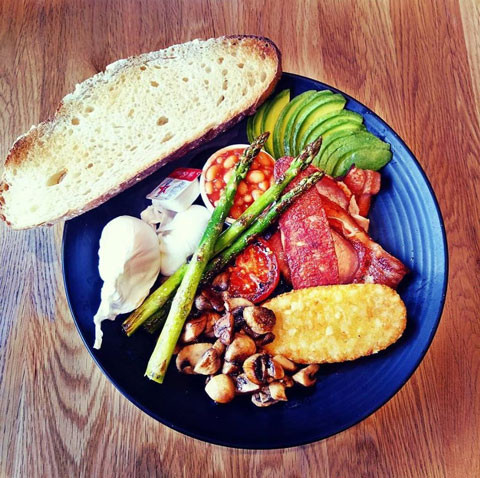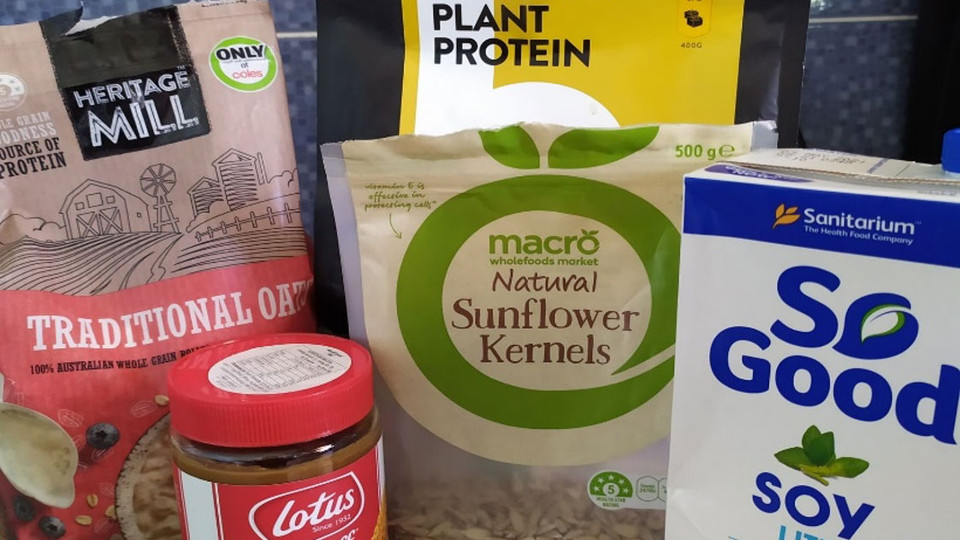
Are you a breakfast lover or skipper?
We’ve all been told that eating breakfast is important for our wellbeing and waistline.
In most instances, WHAT you eat throughout the day matters more than WHEN you eat it.
Breakfast is simply the time we have our first meal. It doesn’t have to be within half an hour of waking up to count. There’s no one size fits all rule because we all have vastly different lifestyles, goals and preferences.
However, there are situations where timing of breakfast DOES matter.
BREKKIE IS IMPORTANT FOR:
Strength and Endurance Performance
Training in a fasted state can backfire. If skipping breakfast before training leaves you feeling sluggish and slow, then the quality of your workout may plummet. The reduced intensity, duration and mental clarity during your workouts can drastically slow your progress. Similarly, don’t skimp out on breakfast if you want to be focussed and at your best mentally when learning a new skill or refining a technique.
Got a tough gym session planned for tomorrow morning? If strength performance is a priority for you, grab a quick bite before you head out to the gym. It’ll help you power through your all your sets without feeling light-headed and reduce your perceived fatigue. Ensuring you have a good dose of protein around your workout can also help you maintain and build muscle. Breakfast is a great opportunity to start your day off with the right nutrients!
Training for half-marathon? You definitely want some easily-digestible carbohydrates beforehand and may need more during your run. A controversially delicious pre-race option is Vegemite and honey on toast. If you can’t stomach that, a small banana, muesli bar or a glass of orange juice are light and easy options.
Undereating is linked to higher injury risk, reduced concentration, and poorer strength and endurance training adaptations. Injury prevention is a lot easier than injury treatment. If you are injured and looking to speed up your recovery, check out this article on how to give your body the best chance at recovering.
Better satiety and healthier dietary choices
Have you ever raided the fridge or pantry after a really long run or workout?
Have you ever waited it out until your notoriously late friend to arrive for brunch and end up ordering a little extra and eating a lot more than you intended to?
You’re not alone. Scientific studies have shown time and time again that we make more impulsive decisions when we’re hungry. These impulsive decisions are not always our best ones. It’s why a quick stop by the grocery store when we’re famished seems to always lead to a full basket of snacks.
Having something to eat when you start to feel hungry can help you make heathier food choices throughout the day. You might start to feel hungry within half an hour of waking, or you might find yourself beginning to feel hunger an hour or two later. There’s no hard and fast rule of when you should eat breakfast to ensure you make good dietary choices, but don’t wait until you’re eyeing down your roommate’s Oreos. Instead, use your hunger signals as a cue to start making you way to the kitchen to choose something nutritious to eat.
There’s research to back this up too. A 2018 study found that in young healthy adults (20-32 years old), breakfast eaters ate less energy-dense snacks (high in carbohydrates and fats) in the evening compared to breakfast skippers.¹ Breakfast eaters also ended up with higher daily protein intakes than breakfast skippers. This study doesn’t mean you have to eat breakfast! It does, however, highlight that having a high protein breakfast may curb late night snacking.
Alternatively, having a nourishing and filling meal waiting for you after a tough morning can make the first thing you reach for a healthier choice.

Most meal companies have breakfast options that can help you get you to lunchtime without the midday slump. Bondi Meal Prep offers Mediterranean breakfast wraps, protein pancakes if you have a sweet tooth and blueberry & ricotta muffins.
Your circadian rhythm and getting a good night sleep
There is an emerging evidence base that when we eat can affect our circadian rhythm and sleep patterns. Circadian rhythm is considered our body’s internal clock and is the 24-hour cycle that our body runs on. It is affected by our exposure to light (from the sun and from our screens) and by our eating patterns. Inconsistent eating patterns and late night snacking can disrupt our circadian rhythm and lead to poorer quality of sleep.
You might notice that a bad night’s sleep puts your appetite into overdrive the next day. This was also shown in the Wisconsin Sleep Cohort Study.² Consistently not getting enough sleep is strongly associated with a higher appetite and increased BMI. Fewer hours of sleep result in higher levels of circulating ghrelin (the hormone that ramps up our appetite) and lower levels of leptin (the hormone that signals to our body that we’re full).³
Eating late at night can get us into a vicious cycle of eating late, skipping breakfast because we slept in or we’re not hungry yet, and then pushing all our meals later in the day. A way to help manage this is to have a regular meal schedule and bedtime. Whatever time you choose to break your fast, try to keep it consistent. Rotating between 3-4 different breakfast ideas can help take the hassle out of choosing what to eat every morning.
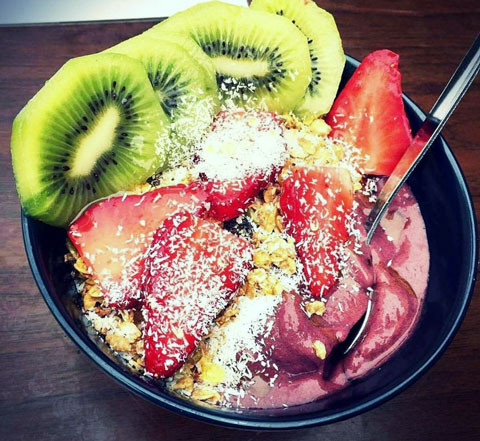
LESS IMPORTANT FOR:
Overall Weight loss and body composition:
If your goal is to drop a few kilos, research highlights that skipping breakfast before you work-out doesn’t make you lose weight faster than eating before you train. Recent meta-analyses showed similar changes in weight loss and body composition, regardless of whether individuals trained after fasting overnight or after eating breakfast.⁴ Similar changes in body composition was seen in women doing steady-state aerobic exercise⁵ and in women doing HITT (high intensity, interval training⁶), regardless of whether they exercised in a fasted or fed state. Instead, it’s all about energy balance! How much you eat (total calories or kilojoules) throughout the day ,matters more than when you have it when it comes to weight loss.
If you find yourself overcompensating and overeating later in the day, then breakfast may help with your weight-based goals. On the other hand, if you don’t get hungry in the morning and find that having a smaller eating window helps you reach your goals faster, then keep doing what you’re doing!
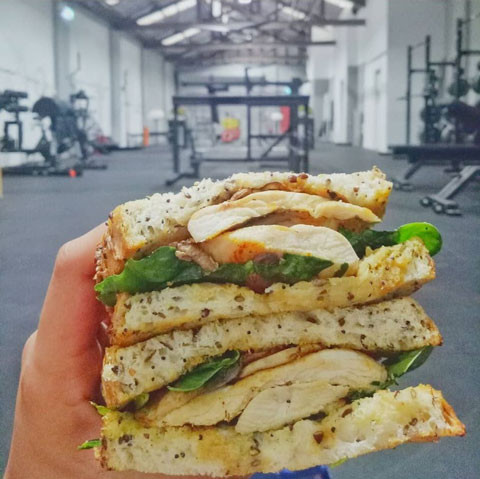
Low-intensity exercise, flexibility or balance training
If you’re going for a short walk, gentle yoga class, tai-chi, foam rolling or stretching then, it’s not necessary to have something beforehand. Use your past experiences and hunger as a guide. If you often get light-headed during exercise or are feeling hungry, breakfast is a great option! A recent systematic review also found that low-intensity exercise after a meal can help with management of blood glucose levels in individuals with and without type 2 diabetes and individuals above the healthy weight range.⁷ If you are not feeling very hungry and prefer getting into that walk as soon as possible (and sitting down for breakfast might make it easier to skip that exercise), jump right into it!
Still struggling to eat in the morning or not quite ready to commit to adding another meal into your routine? Try pushing your first meal of the day an hour earlier, until you get used to eating earlier in the day.
NOT IMPORTANT FOR:
Burning more body fat.
How many times have you been encouraged you to train fasted to reach your fat loss goals faster? In general, 8-12 hours without food is considered a fasted state. I’ve been told countless times by well-intentioned but misinformed personal trainers, friends and even strangers in the gym changerooms.
One thing we can all agree on is training fasted doesn’t burn more body fat. Training fasted in the mornings makes our body rely on fat as a fuel source, but it will result in similar energy expenditure and weight loss regardless of whether your body is burning dietary fat or carbohydrates.
Boosting your metabolism
This myth exists because long periods without adequate energy coming from food can reduce how much our body burns at rest. This is mainly due to the loss of muscle mass. However, this is for extended periods of time over 10 days, not just the 8-10 hours we’re asleep in.
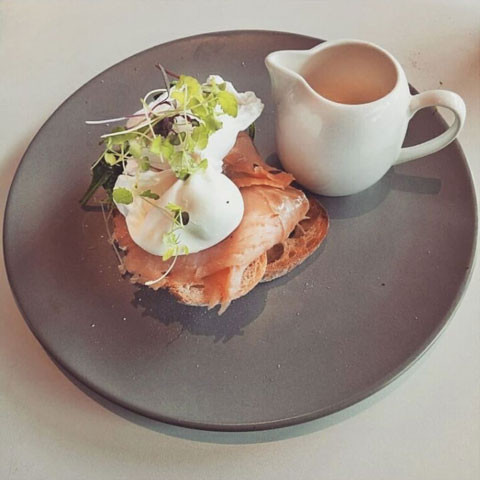
Your first meal of the day is important but when you have it is completely up to you and your lifestyle. It is simply when you decide to break the fast.
If you’re goals and lifestyle are better aligned with eating breakfast but you’re a bit unsure where to begin, start small. Try boiled eggs on a slice of wholegrain toast, a piece of fruit or a glass of Milo. If you have a sweet tooth, keep it sweet & simple: ricotta, honey, wholegrain toast & sea salt (add berries for extra fruit). A healthy vegan option is peanut butter, banana & soy and linseed bread. Sprinkle with chia seeds for a good dose of plant-based Omega-3s. If you have a little extra time in the morning, you can try whipping up a fancy & filling bowl of oats topped with your favourite fruits, seeds and spreads.
